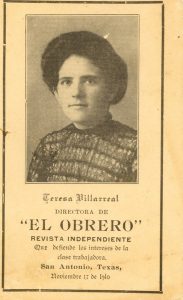Activist and journalist Jovita Idár wrote for La Crónica and other publications. Image from UTSA Special Collections.
Like other non-white minorities, Mexican-American women in Texas were denied formal participation in the state suffrage movement. But this disenfranchisement did not deter Mexican-American women leaders from taking a public position on votes for women or other matters of politics, social reform, and injustice that played out daily in the state’s Mexican-American population.
During this era, news periodicals were important avenues for creating awareness of social issues—even more so than they are today, as they were the only news media channels available and thus widely consumed.
One publication that called for votes for women was La Crónica, a Spanish-language newspaper that began publication in Laredo, TX sometime in the 1890s.
The paper was managed by Nicasio Idár and his children—including Jovita Idár, a teacher turned journalist and activist who became well known for her fight for equitable education opportunities for Mexican-American children.
Jovita was also the founder of La Liga Feminil Mexicanista, a women’s cultural, charitable and political organization that championed education and other causes, including suffrage.
In addition to encouraging the preservation of Mexican culture, La Crónica gave extensive, often exclusive coverage to the economic and social conditions of Mexican-Americans in Texas, often exposing and denouncing the discrimination and inequity that was often rampant in Mexican-American communities.
In 1911, the paper reported about El Primer Congreso Mexicanista, a multi-day conference Jovita organized to bring Mexican-American women together to discuss social and political issues. Around this same time, Jovita published a pro-suffrage piece in La Crónica.
Another Texas publication operating in a similar space as La Crónica was La Mujer Moderna, a feminist newspaper founded by San Antonio sisters Andrea and Teresa Villarreal, who were activists and political organizers.

On the left: Feminist journalist Teresa Villareal. Image from Arte Público Press, University of Houston, Houston, TX.
The Villareal sisters used the publication to forward their views on social, political and economic reform as they related to conditions for Mexican-Americans in Texas, often taking a bold or radical stance. La Mujer Moderna also urged Mexican-American women to assert their rights, including the right of suffrage.







